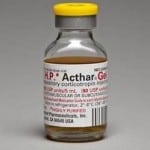PORPP Faculty Member Ryan Hansen and Research Team Present Findings at the 12th World Congress on Inflammation in Boston, Massachusetts
 UW School of Pharmacy Research Assistant Professor Ryan Hansen, along with Patricia Schepman, John Niewoehner, Michael Philbin, and Kavitha Damal of Mallinckrodt Pharmaceuticals, are presenting study findings in two posters at the 12th World Congress on Inflammation (August 8-12, 2015). The posters look at the health economic outcomes of H.P. Acthar® Gel in treating Infantile Spasms and Multiple Sclerosis relapses. Patients in both studies were identified by using the Truven Health Analytics MarketScan® commercial and Medicaid claims and encounters databases.
UW School of Pharmacy Research Assistant Professor Ryan Hansen, along with Patricia Schepman, John Niewoehner, Michael Philbin, and Kavitha Damal of Mallinckrodt Pharmaceuticals, are presenting study findings in two posters at the 12th World Congress on Inflammation (August 8-12, 2015). The posters look at the health economic outcomes of H.P. Acthar® Gel in treating Infantile Spasms and Multiple Sclerosis relapses. Patients in both studies were identified by using the Truven Health Analytics MarketScan® commercial and Medicaid claims and encounters databases.
Infantile Spasms (IS) Findings
Infantile spasms (IS) typically occur within the first year of life. Children with IS frequently experience spasms, hypsarrhythmia and psychomotor retardation. Acthar is an adrenocorticotropic hormone (ACTH) analogue that is FDA approved for the treatment of IS. Long-term prognosis of IS patients, specifically neurodevelopmental outcomes, is relatively poor.
The team studied the impact of ACTH therapy on patient outcomes by comparing the economic consequences of initiating ACTH early (within 30 days of IS diagnosis) with that of late ACTH treatment (> 30 days after diagnosis). A total of 259 IS patients <2 years old were identified; 76 percent of patients used ACTH early and 24 percent of patients were late users of ACTH.
The researchers estimated and compared the healthcare resource use and costs (inpatient, outpatient, and pharmacy) separately for patients in the two groups and found that the economic burden was lower for patients who received ACTH early: 16 percent fewer outpatient visits and 15 percent reduction in overall healthcare resource use. Unadjusted 12-month total outpatient costs (excluding the costs of administering ACTH) for early users were 30 percent lower, as were the total medication costs. Additionally, the relative rate ratio of outpatient visits, overall healthcare resource utilization, and total medication costs (excluding ACTH costs) were significantly lower in early ACTH users.
The team concluded that the economic consequences of treating patients with ACTH within 30 days of IS diagnosis may be associated with decreases in overall healthcare resource use, outpatient visits and total medication costs. The team notes that future studies are needed with a larger cohort of IS patients to ensure statistical significance and to examine the economic outcomes among patients who receive ACTH compared to other IS treatments.
Multiple Sclerosis (MS) Findings
Multiple Sclerosis (MS) is an autoimmune, neuro-inflammatory disorder characterized by acute exacerbations (‘relapses’), interspersed between remissions. MS relapses impose a heavy economic burden on society and are commonly treated with intravenous methylprednisolone (IVMP), and for some difficult-to-manage relapses, other hormonal therapies such as repository corticotropin injection (ACTH, Acthar), intravenous immunoglobulin (IVIG) and plasmapheresis (PMP). In this study, the team explored the economic burden accrued among MS patients with difficult to treat relapses comparing the health resource utilization, outcomes, and costs in patients who received ACTH versus IVIG or PMP.

A total of 439 Patients with ≥ 2 MS relapse episodes between 2007 and 2012 were identified; the first relapse was treated with IVMP and subsequent relapses were treated with ACTH, IVIG, or PMP. 49 percent of patients were treated with ACTH and 51 percent patients with IVIG/PMP for their second relapse. Of those, 228 had 24 months of continuous follow-up data, among whom 42 percent received ACTH and 58 percent received IVIG/PMP for their second relapse.
Through their analysis, the team found that patients who were treated with ACTH had significantly fewer hospitalizations and outpatient visits in the first 12 months, resulting in lower inpatient and outpatient costs, and similar total costs at one year. Additionally, total costs were still similar between the two groups in adjusted analyses. The findings of reduced outpatient services and costs and comparable total costs were consistent among the subgroups with 24 months of continuous follow-up data.
Difficult to manage MS relapses pose a challenge to clinicians and patients. In this analysis, the team found that treating these relapses with ACTH may be associated with decreased resource use and incur similar costs as IVIG or PMP, thereby supporting the value of ACTH in MS relapse.